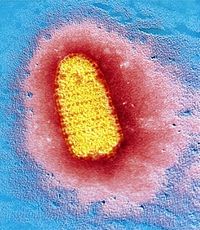Rabies: Difference between revisions
| Line 11: | Line 11: | ||
=Description= | =Description= | ||
Rabies (derived from Latin meaning 'Madness') is a viral disease caused by Lyssavirus rabies virus. The disease is extremely lethal to those unfortunate enough to show symptoms of the infection. The primary transmission of the virus to humans occurs through dog bites and scratches. The numbers vary widely form country to country, however, it is estimated that 55,000 die per year from the rabies virus | Rabies (derived from Latin meaning 'Madness') is a viral disease caused by Lyssavirus rabies virus. The disease is extremely lethal to those unfortunate enough to show symptoms of the infection. The primary transmission of the virus to humans occurs through dog bites and scratches. The numbers vary widely form country to country, however, it is estimated that 55,000 people die per year from the rabies virus in Asia and Africa . The disease can be dramatic in its appearance as with many animals the disease is known to cause hyperactivity and sporadic behavior while becoming aggressive to things around them and eventually succumbing to paralysis of muscles. | ||
=History and Impact= | =History and Impact= | ||
Revision as of 20:15, 18 July 2013

Taxonomy
| Order = Mononegavirales | Family = Rhabdoviridae | Genus = Lyssavirus | species = Rabies Virus|
Description
Rabies (derived from Latin meaning 'Madness') is a viral disease caused by Lyssavirus rabies virus. The disease is extremely lethal to those unfortunate enough to show symptoms of the infection. The primary transmission of the virus to humans occurs through dog bites and scratches. The numbers vary widely form country to country, however, it is estimated that 55,000 people die per year from the rabies virus in Asia and Africa . The disease can be dramatic in its appearance as with many animals the disease is known to cause hyperactivity and sporadic behavior while becoming aggressive to things around them and eventually succumbing to paralysis of muscles.
